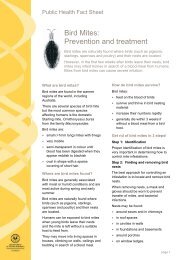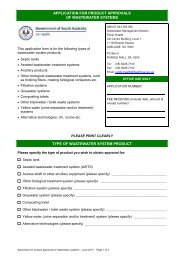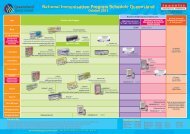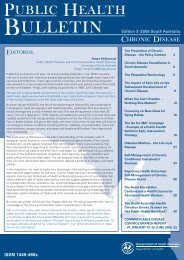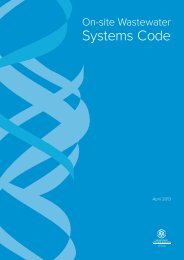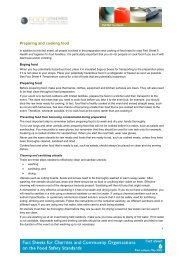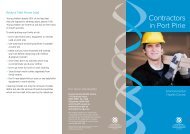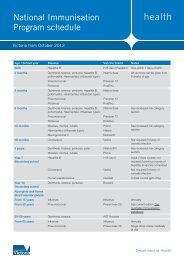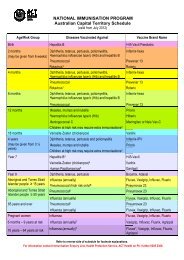Food Act Report 2009/2010 - SA Health - SA.Gov.au
Food Act Report 2009/2010 - SA Health - SA.Gov.au
Food Act Report 2009/2010 - SA Health - SA.Gov.au
You also want an ePaper? Increase the reach of your titles
YUMPU automatically turns print PDFs into web optimized ePapers that Google loves.
Administration of legislationStates and territories have enacted <strong>Food</strong> <strong>Act</strong>s based on model food provisions as agreed under the <strong>Food</strong> RegulationAgreement 2002. Also under the agreement, states and territories have adopted the Code through their <strong>Food</strong> <strong>Act</strong>s.The model for administration of <strong>Food</strong> <strong>Act</strong>s differs between jurisdictions with either state and territory governmentstaking sole responsibility or responsibility being shared between State <strong>Gov</strong>ernment and local government.The Australian Quarantine Inspection Service (AQIS) is responsible for the control of imported food which mustalso comply with the Code.States and territories have traditionally regulated food safety in the domestic meat, dairy and shellfish industriesunder Primary Industry <strong>Act</strong>s, administered by primary industry departments. In recent times there have been movesin some jurisdictions to integrate this legislation into single Primary Industry <strong>Act</strong>s or modified <strong>Food</strong> <strong>Act</strong>s, withcorresponding changes in administration. AQIS has responsibility for food safety regulation of the export meat,dairy and shellfish industries. Some jurisdictions, in some industries, share enforcement responsibilities betweenAQIS and states/territories.Developing and overseeing a consistent approach across jurisdictions to the implementation and enforcement offood regulations and standards (regardless of whether food is sourced from domestic producers, export-registeredestablishments or from imports) is the role of the Implementation Sub Committee (ISC) – a sub committee of the<strong>Food</strong> Regulation Standing Committee (FRSC).ISC members are either heads of their agencies or operational experts at senior level with capacity to makeand implement decisions about enforcement issues in their jurisdictions. The membership comprises up to tworepresentatives from each state and territory; one representative from each of the Commonwealth Departmentsof <strong>Health</strong> and Ageing, Agriculture, Fisheries and Forestry – Australia and AQIS; F<strong>SA</strong>NZ; one representative fromNew Zealand; and one representative from the Australian Local <strong>Gov</strong>ernment Association. <strong>SA</strong> <strong>Health</strong> is representedby the Director of <strong>Food</strong> Policy and Programs Branch.ISC developed a strategy for consistent implementation and enforcement of food regulation in Australia thatincorporates a rolling work plan and contains eight components, each sponsored by an ISC member. The strategywas endorsed by the Australian and New Zealand <strong>Food</strong> Regulation Ministerial Council (Ministerial Council) inOctober 2005. It was updated by ISC in July 2007. ISC reports at each FRSC meeting on progress with the rollingwork plan and specific projects. FRSC reports annually to the Ministerial Council against the key performancemeasures. The strategy is available from the <strong>Food</strong> Regulation Secretariat website: www.foodsecretariat.health.gov.<strong>au</strong>Through its Strategic Plan <strong>2009</strong>–2014, FRSC established six priorities for ISC in <strong>2009</strong>–10. The following six ISCpriorities sit within Priority 4 (Consistency of implementation improved) and Priority 7 (Evidence base and evaluationcapability improved) of the FRSC strategic plan:1. The integrated model for standards development and consistent implementation piloted on the EggsPrimary Production and Processing Standard.2. National framework for <strong>au</strong>ditor management operating.3. National enforcement policy operating (including road-testing with local government).4. Consistent Interpretation of Regulatory Standards.5. <strong>Food</strong> surveillance system linkages scoping project completed.6. Framework for evaluation of ISC strategic plan implementation.In <strong>2009</strong>–10 ISC proposed changes to the component structure of the ‘ISC Strategy for Consistent Implementation of <strong>Food</strong>Regulation’. The changes were endorsed by FRSC in March <strong>2010</strong>. It still incorporates a rolling work plan and containseight components each sponsored by an ISC member. Details of the new eight components are provided below.<strong>SA</strong> <strong>Health</strong> is sponsor of Component 3 – <strong>Food</strong> Safety Incident Response and Management Systems, with the aim ofmaintaining an effective system for the management of national food safety incidents.<strong>Food</strong> <strong>Act</strong> <strong>Report</strong> Year ending 30 June <strong>2010</strong> page 8



